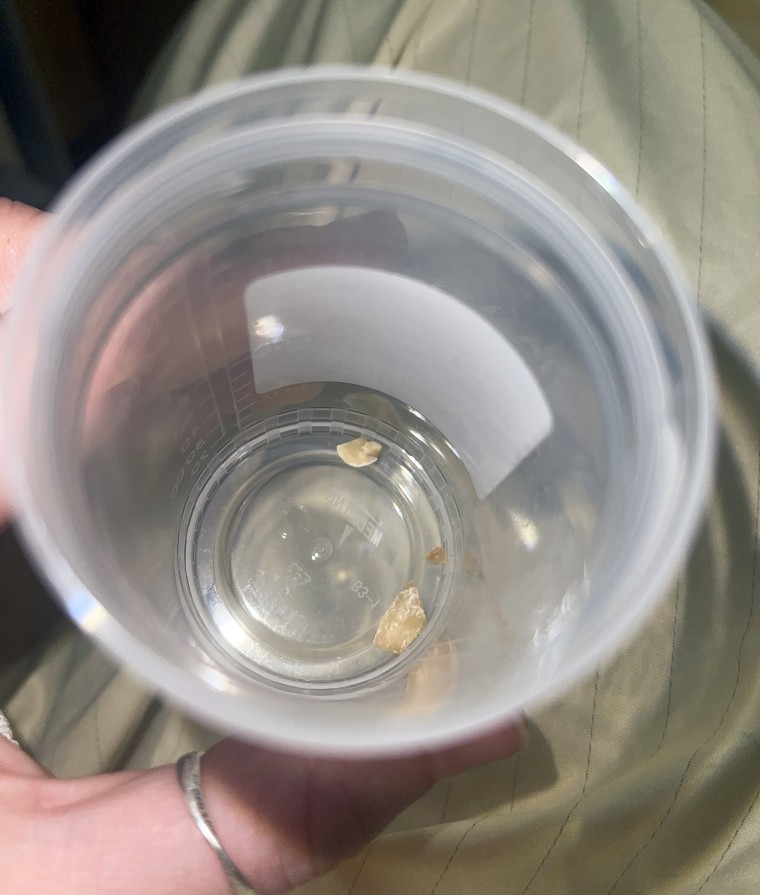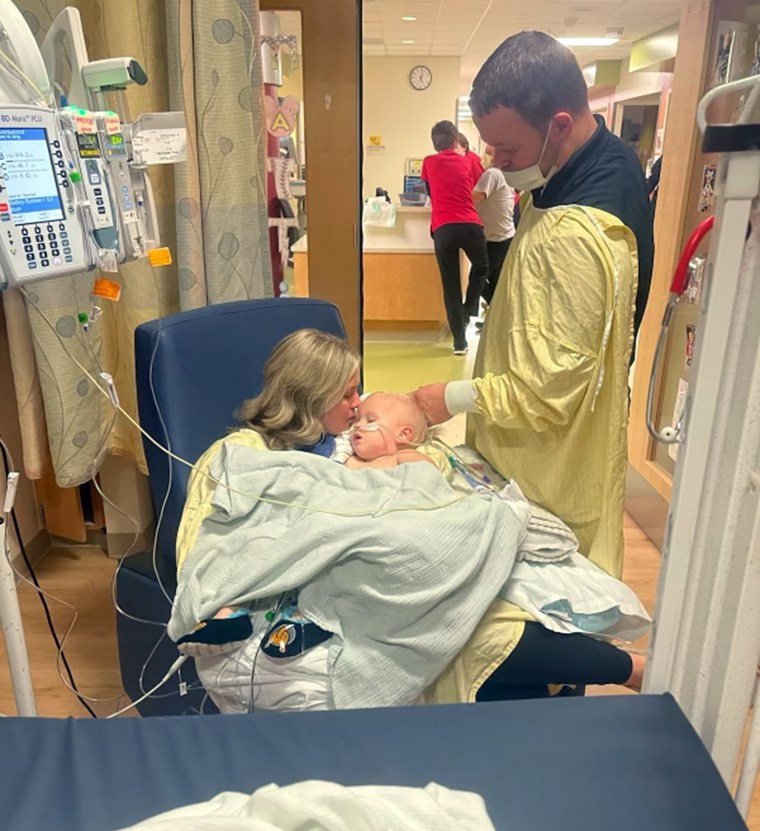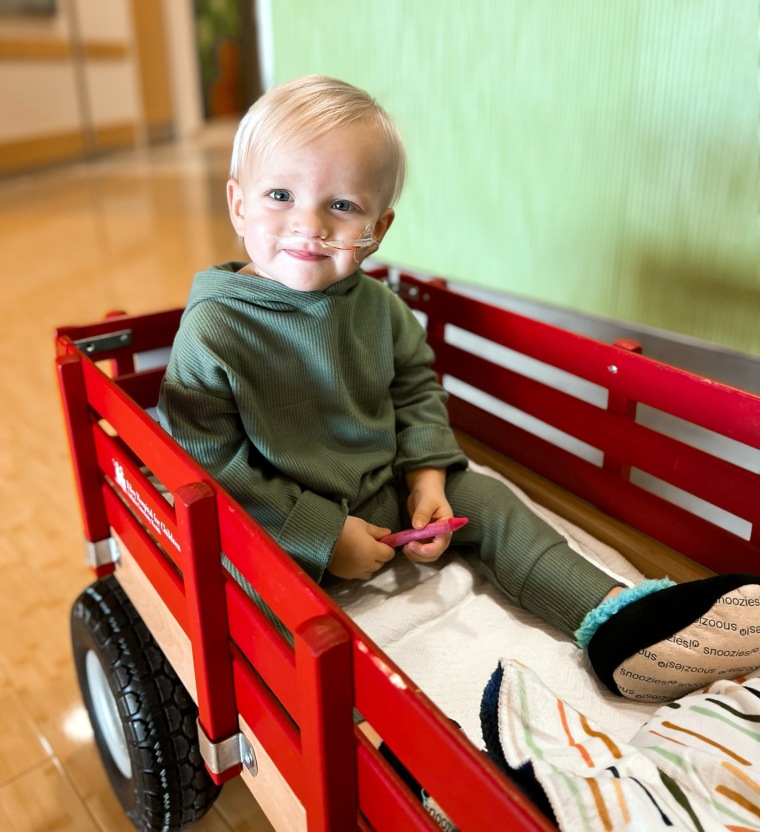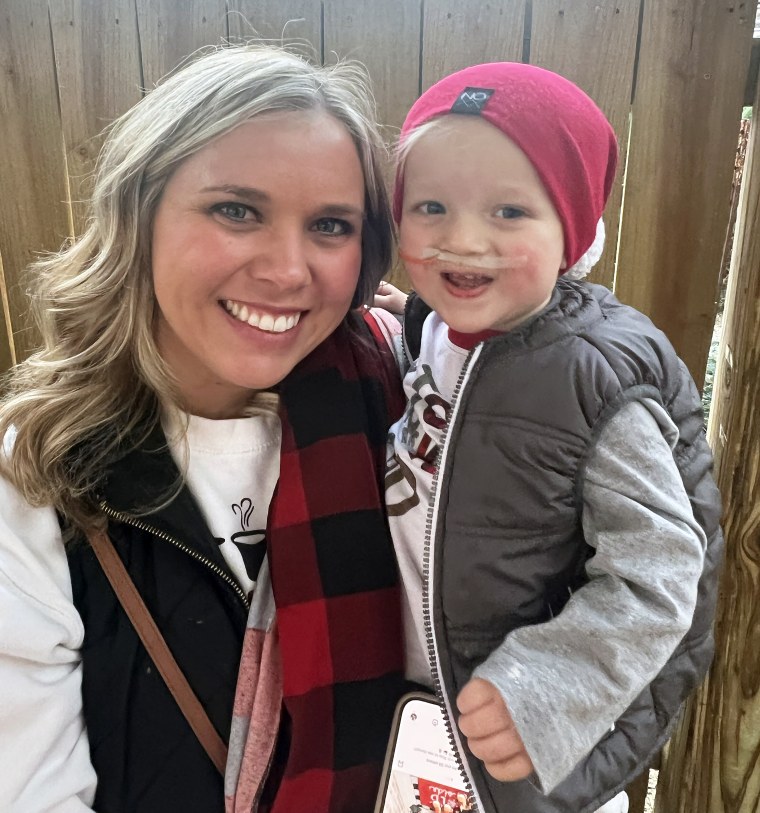It happened so quickly. Mattie Atkinson, then 16 months old, was sitting beside his older sibling, who was eating a snack. Mattie shoved something into his mouth, then began coughing violently. His parents soon realized that he had popped a tiny piece of peanut into his mouth.
“He went into a coughing fit for 30 minutes,” Justine Atkinson, 33, of Greenwood, Indiana, tells TODAY.com. “My husband and I were obviously worried. ... We immediately called the pediatrician.”
As the family waited for the doctor to return their call, Atkinson calmed Mattie and gave him some water. He fell asleep, which seemed like a good sign. His parents had no idea that the peanut was still blocking his airway, a danger that would turn potentially fatal.

A dangerous situation
When the pediatrician called the family back after Mattie’s initial coughing fit, he put the family at ease. By this time, Mattie seemed back to his usual self and had fallen asleep.
“(The doctor’s) response to us was that it was probably a good thing that Mattie was sleeping because if there was possibly something in his airway, he would be uncomfortable,” Atkinson explains. “That made me feel better.”
The next day, though, Mattie began wheezing. His two older brothers had colds, so Atkinson thought Mattie's wheezing might be related. A few days later, she took him to the pediatrician to be sure.
“The pediatrician listened to him and ended up diagnosing him with RSV,” she says.
For about a week, Mattie seemed off.
“It’s not like he was getting worse,” Atkinson says. “But he wasn’t getting better.”
When he stopped drinking milk and water, Atkinson called the pediatrician’s office again and the staff assured her that she was doing everything right. The next day, though, Mattie coughed up mucous and started turning blue.
“His lips turned blue. His color was really starting to go pale. And he didn’t completely go unresponsive, but it was definitely a lot of me trying to keep him with us,” she says. “We just put him in our car and went straight to the hospital.”

Doctors gave Mattie oxygen and performed a chest X-ray. He was transferred him to the Riley Hospital for Children in Indianapolis, where doctors intubated him and put him on a ventilator.
His chest X-ray revealed that his left lung had collapsed. At first doctors thought it was because he had an enterovirus, parainfluenza and pneumonia. But when his lung kept collapsing, Atkinson mentioned to Mattie’s night nurse that she was worried the piece of peanut could be hurting his breathing.
“The next day when the nurse was leaving, she had talked to the doctor and was like, ‘Mom is worried about the possible peanut with his lung collapsing. I really feel like we should do a (bronchoscopy),’” Atkinson recalls.
Later that day, Atkinson reminded a doctor about the peanut as he inserted a camera into her son’s airway.
“Then he says, ‘There’s a peanut,’” she recalls. “It all made sense because it was sitting right at the top of his left lung. And obviously we were all happy to finally have answers.”
Before they could remove the peanut, Mattie’s oxygen dipped dangerously low. The medical staff struggled to revive him and called a "code blue."
“He had to go on ECMO,” says his mom, referring to extracorporeal membrane oxygenation, a form of life support.
After Mattie's condition stabilized, doctors removed the peanut, which had broken in two and was cutting off 95% of his oxygen, his mom explains.
“He was on ECMO for four days while they let his left lung heal and re-inflate,” she says. “They were able to start weaning him off … and he could start to move around a little more.”

Aspiration and young eaters
Sometimes food really can “go down the wrong pipe,” especially when toddlers are eating.
“Inhaling something is not something we think that happens frequently, but we do see it, particularly in young children,” Dr. Brian Gray, a pediatric surgeon at Riley Children’s Health, tells TODAY.com. “It’s the kids who are just getting out there on their own and working on eating solid foods.”
Children who aspirate food are normally not brand new eaters; often they are a little bit older and trying to navigate food independently. Experts say the most commonly aspirated foods are:
- Grapes
- Blueberries
- Hot dogs
“They just don’t chew it up enough, and then tend to inhale it,” Gray explains.
He adds that older children in elementary or middle school sometimes aspirate pen caps or tiny bits of plastic that they mindlessly chew on and accidentally inhale. Gray advises parents to seek medical help if their child's breathing changes.
“If the parent hearts their child wheezing audibly, that’s a sign that there’s something caught in the airway and there’s difficulty for air passing by whatever that object is,” Gray says. “The first thing you need to do to help is either talk to your pediatrician or go to the emergency department.”
While parents might try the Heimlich maneuver to help their child, he said, the first aid procedure generally only works with bigger objects.

Even something tiny, such as the peanut, can block a child’s airway, which is about “the size of their pinky finger,” Gray explains.
“It’s pretty amazing just what can get stuck in there and cause major problems,” Gray says.
Related: 7-year-old saves choking classmate with moves he learned from TV medical drama
Coming home
Mattie’s situation was complicated by the fact that he had two viruses and pneumonia. He came home with a feeding tube, and he’s been having a little trouble swallowing liquids since his ordeal with the peanut.
Atkinson says this experience has taught her the importance of advocating for her children.
“I’ve learned to follow my intuition as a mom,” she says. “There’s no better assessment of a child than a mother, than their parents, so I’m just making sure that I’m continuing to follow my intuition and be the voice for my kids.”

Atkinson also encourages parents to be aware of their children’s environments, “making sure all the food is cut up and they’re not laying down whenever they’re eating, and keeping eyes on them as best you can.”
“I would have never thought that something so small like that would have done all this damage to our sweet boy,” she says.
Related video: